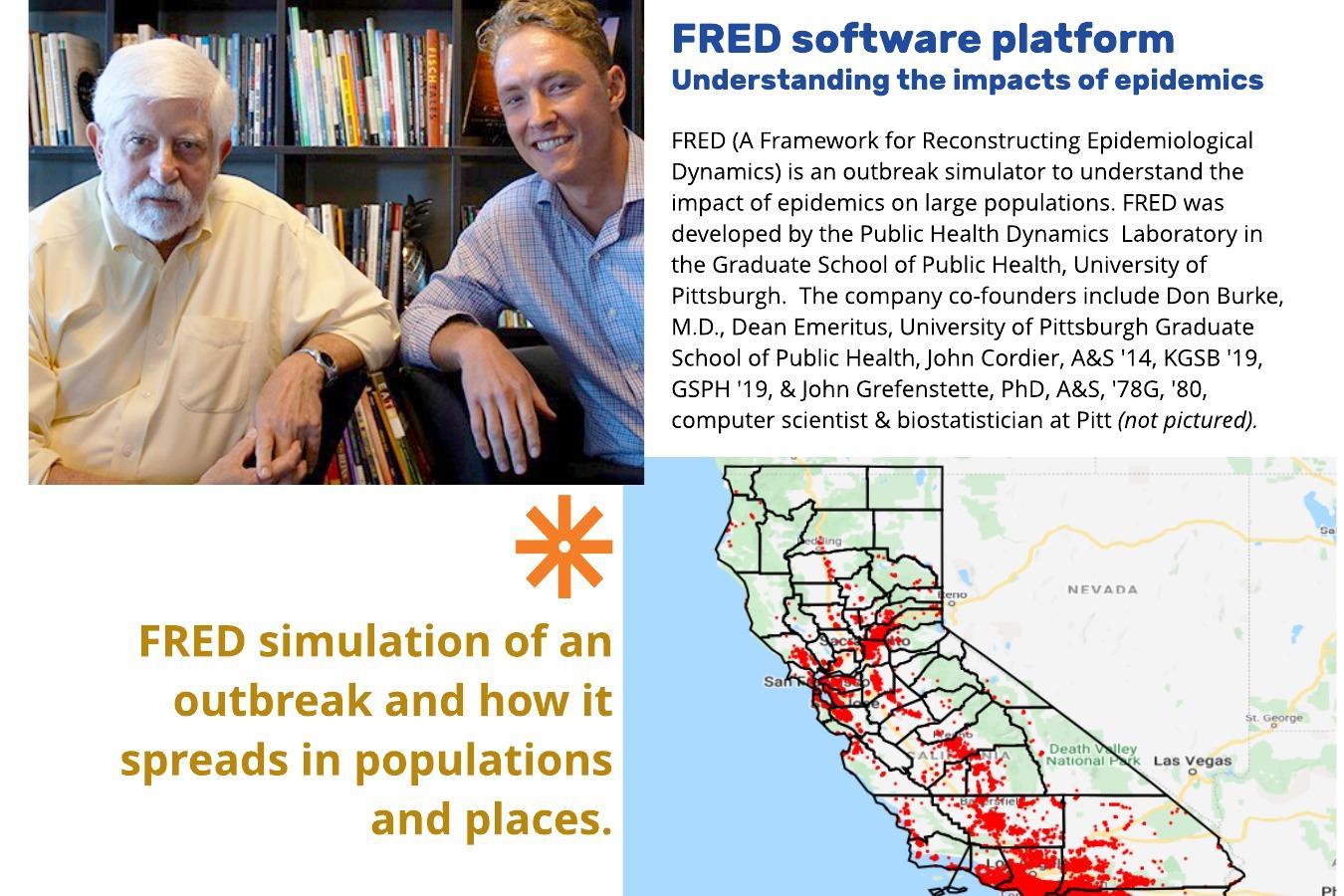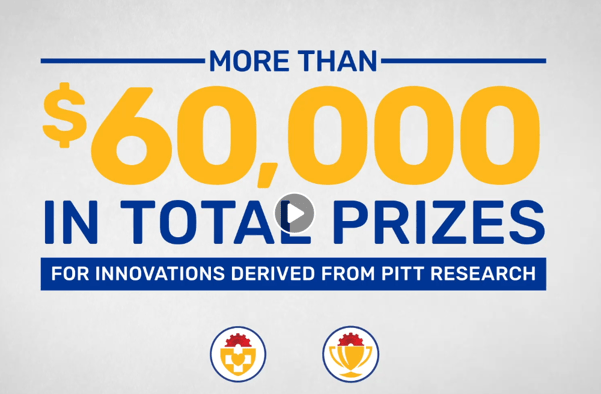We are regularly checking in with Pitt spinout companies to get an update on their progress in developing their products, acquiring customers and adding employees. Today we catch up with John Cordier (pictured on right) co-founder of Epistemix Inc., whose technology could not be more relevant to the current global public health challenge.
Epistemix is based on the research of Donald Burke, MD, former dean of the Pitt Graduate School of Public Health (pictured above on left), and John Grefenstette, PhD, A&S, '78G, '80 former professor of Biostatistics and Health Policy and Management (not pictured). Burke and Grefenstette and their colleagues began developing FRED (Framework for Reconstructing Epidemiological Dynamics) a decade ago as a modeling system to predict the progression of disease outbreaks.
Cordier received both his undergraduate degrees from Pitt in biology and sociology in 2014, after which he did a two-year stint in the Teach for America program in Texas, before coming back to Pittsburgh to begin graduate studies. Last April, he received a joint master’s degree from the Graduate School of Public Health, together with an MBA from the Katz Graduate School of Business.
Cordier has demonstrated an interest in entrepreneurship throughout his time at Pitt, taking the lead in bringing the FRED platform toward commercial translation. He led the project through the Innovation Institute's First Gear program to help determine its commercial potential. He then spearheaded the project’s entry in the 2018 Kuzneski Innovation Cup competition, part of the Pitt Ventures Student Challenge, and walked away with the $15,000 top prize. Shortly after, he represented Pitt as the university’s first entrant in the Rice Business Plan Competition, the largest graduate student business competition in the nation. While Cordier didn’t win the Rice competition, he did win $75,000 in the Smart Cities Global Business Challenge competition in Australia later that year.
Innovation Institute: So before the COVID-19 outbreak, what had Epistemix been up to?
John Cordier: We executed the license with Pitt last April to take the technology out of the university, raised a small amount of funding and moved into office space in the LifeX Labs in the South Side. Now we are at the point of raising a Series A round; meeting with investor groups not just in Pittsburgh, but Atlanta, Austin, San Diego and the Bay Area. We haven’t accepted any terms yet.
Innovation Institute: What are your plans for expansion?
John Cordier: With this round of funding, we’ll add 15-20 people. Some will be software developers, particularly front end user experience developers to enable greater access to our platform. We are also seeking a GIS solutions engineers for geospatial analysis, as well as for the migration of the platform to the cloud. We will also be seeking director of marketing and some business development people to work in our public health, healthcare, and government verticals.
Innovation Institute: How has the COVID-19 outbreak affected your rollout plans?
John Cordier: This is helping us grow up quicker. It’s accelerating our maturity as a company. We had been going down a path to expand beyond just infectious disease modeling because our platform is capable of so much more, but obviously there is a huge demand right now for the kind of predictive analytics that we provide. Just about every industry is looking at, “How is this going to impact our market?” We can provide the link with how things are spreading and what impact it would have.
We have been working with the Public Health Dynamics Lab at Pitt to assist in local and state pandemic response. We’ve been approached to do modeling for states outside of PA, and once we have those models fine-tuned, we’re going to look to go to other places to provide decision support. Additionally, we have also started talking to firms with more financial scenario planning expertise about integrating with our platform to provide economic and financial analysis to examine future economic and social consequences of COVID-19 responses.

Innovation Institute: What kinds of decisions does your platform support?:
John Cordier: At Epistemix, our philosophy is to build models that directly support the decision-making needs of our clients, including the ability to accurately represent the population of the city, county, or state of interest, the selection of parameters that best capture the local transmission dynamics, and the prioritization of interventions to be tested.
We provide the support and enable clients to create computational simulations to develop and evaluate epidemic control policies and how a population of people changes over time. Our platform supports decisions that integrate geography, demographics, social contacts, environmental interactions, and individual responses and behaviors. Such individual responses can vary according to an individual’s age, sex, race, income, family setting, membership and various social interaction groups (neighborhood, school, workplace, etc.). Once a model is built on our platform, any number of interventions or strategies can be played out to develop and evaluate decision making to achieve outcomes important to the policy-maker, such as school closure, work sick days, vaccine deployment, diagnostic testing strategies, and essentially any type of public health intervention.
Specific to COVID-19, we can customize a model to represent COVID-19 epidemic spread using best available information on COVID-19 parameter estimations. This allows us to simulate the effects of basic epidemic control interventions to include social distancing, paid sick leave, and school closures and produce analyses, maps, and movies to communicate results. We then can model statewide resource allocations and capacity planning. This analysis shows infected persons who require hospitalization and ICU treatment, the key healthcare resources such as number of beds, ICUs, and health care staffing and the effects of the epidemic on these assets. We also consider other factors such as seasonality and the role of children in epidemic, model the impact on nursing homes and other vulnerable populations, and can simulate other interventions as guided by a state, county, or healthcare system.
Further, we can extend our understanding of the spread and responses to the epidemic to evaluate the downstream social and economic consequences of the response strategies. This taps into the capabilities of our platform to forecast changes in social dynamics and tradeoffs people and business will consider after extended social distancing.
Innovation Institute: Does the company continue to maintain close ties to Pitt?
John Cordier: Absolutely. Our group is closely tied in with the Public Health Dynamics Lab at Pitt. Don (Burke) is still a faculty member, and we have a good working relationship with the team.
Innovation Institute: What other interesting things are happening for Epistemix?
John Cordier: We partnered with ESRI in the fall. ESRI is the largest geo-spatial information systems company in the world. They have a network of 8 million users globally. Our platform has GIS as a component, but we do more advanced predictive and prescriptive analytics on top of that. We’ve also been approached to put a book together with Forbes Books. And just as an interesting note, Don (Burke) wrote a paper on predicting and preventing emerging viruses 23 years ago in which he was the first scientist in the world to predict that coronaviruses posed serious threats to human health. I think it is fair to say we have a great team doing this work.
If you have an innovation resulting from your research and a student interested in exploring its commercial potential, consider applying for the Pitt Ventures Student Challenge competitions: the Michael Wells Health Care Competition and the Kuzneski Innovation Cup. Click here to learn more.
